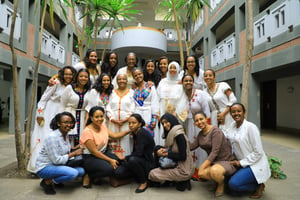Medics.Academy and Ethiopian Medical Women’s Association to address health worker shortfall and strengthen women physician leaders across Ethiopia
February 8, 2021
- UK- Ethiopia collaboration to target 70% of female physicians over 5 years
- WHO predicts global shortfall of 18 million health workers by 2030 - Ethiopia identified as one of 57 countries with chronic shortage
- COVID-19 has led to a significant shift to digital adoption in learning making remote learning the ‘new normal’
 Medics.Academy – a revolutionary UK company delivering global access to world-leading medical education and the Ethiopian Medical Women’s Association (EMeWA) have signed a partnership agreement to help women physicians in Ethiopia.
Medics.Academy – a revolutionary UK company delivering global access to world-leading medical education and the Ethiopian Medical Women’s Association (EMeWA) have signed a partnership agreement to help women physicians in Ethiopia.
The project will help EMeWA - an organisation established by female physicians in Ethiopia - to fulfil its vision to establish an excellence center for women physicians through one of its main thematic areas of professional development.
As part of the collaboration Medics.Academy will be investing £250,000 GBP (over 12 million Ethiopian Birr) in building a new learning community to provide digital access to training and support a target of 70% of female physicians in Ethiopia over the next 5 years – identified by the World Health Organization (WHO) as one of the 57 countries in the world with a chronic shortage of health workers.
The unique collaboration has been endorsed by the Ministry of Health of Ethiopia and, by championing access to online education, aims to drive digital transformation to help address the country’s health workforce needs, promote professional development and achieve greater representation and leadership of women in medicine.
Globally, the COVID-19 crisis has led to a significant shift to digital adoption that will likely persist post-pandemic. While there has been high growth in the adoption of education technology in recent years, this move has been deeply accelerated by COVID-19. Remote learning has become a vital part of education delivery and all across the world has been enrolled into the ‘new normal’.
Dr Alastair McPhail CMG OBE, UK Ambassador to Ethiopia, said: “We are very proud of the partnerships between the UK and Ethiopia on health. The coronavirus pandemic has stretched health systems and healthcare workers to their limits.”
“I hope that this new partnership will inspire and upskill female doctors across Ethiopia, directly contributing to high quality, equitable health services and ending the avoidable deaths of mothers and children.”
The pandemic has also brought pressures on health systems around the world and highlighted already existing health shortages. This includes a projected shortfall of 18 million health workers worldwide by 2030. In Ethiopia, WHO has been supporting the Ministry of Health to help increase the number of health workers and improve their skills since the beginning of the pandemic.
Dr Lia Tadesse, Minister of Health of the Federal Democratic Republic of Ethiopia, added: “Professional Development of women in healthcare is an area of priority for us in Ethiopia. Even though women make up the larger proportion in the healthcare industry, they are not visible in leadership as we want them to be due to the various challenges they face to advance their professional growth. As a result, we have few women representation in places where their voice matters and their contributions are vital. This partnership will help change this by creating an innovative learning hub that will help women foster their leadership role and advance in their careers.”
Over the last four years EMeWA has been working on professional development, rights of women physicians and community development to bring a holistic advancement of women in the health sector. The organization has been providing training on soft skills and mentorship for women physicians in their early careers and has a webinar series where major topics in the health sector are discussed.
EMeWA has also been increasing the visibility of women physicians who are exemplary in their practice through its Celebrating Women project which served as an inspiration for many and highlighted the increasing role of women in the healthcare system of the country.
Going forward, Medics.Academy will be working with the organisation to deliver tailored education programmes that can drive improvements in skills and diversify the country’s healthcare workforce.
Dr. Senayit Beyene, the President of EMeWA commented: “The project will help deliver quality and affordable learning opportunities which are both accredited and acceptable both locally and internationally. It will also create the platform to establish strong and practical networks and connections around the world for collaborations and mentorship. Our ultimate goal is to develop a learning community that acknowledges and builds on the different skill sets of its members at all levels. I am confident that Medics.Academy’s pioneering education platform will help to plug this gap in a sustainable manner.”
Empowering women in health leadership is a core strategic focus for Medics.Academy. The company supported the establishment of the Women in Healthcare Leadership (WIHL) programme to increase opportunity for representative leadership in the UK’s NHS. The innovative programme has since expanded overseas, supporting healthcare professionals and building a supportive platform that champions inclusivity at leadership level.
 Dr Johann Malawana, Chief Executive Officer at Medics.Academy, said: “Over the last four years, we have sought to formalise various initiatives, to promote diversity of thought and ideas and help to create a global community of healthcare leaders of the future. Inclusivity is absolutely key to leadership and this collaboration is reflective of our long-term strategy to foster frontline innovation and increase women’s representation in healthcare globally. Our overall objective is to work towards removing gender and other barriers, to pursuing leadership roles in Healthcare.”
Dr Johann Malawana, Chief Executive Officer at Medics.Academy, said: “Over the last four years, we have sought to formalise various initiatives, to promote diversity of thought and ideas and help to create a global community of healthcare leaders of the future. Inclusivity is absolutely key to leadership and this collaboration is reflective of our long-term strategy to foster frontline innovation and increase women’s representation in healthcare globally. Our overall objective is to work towards removing gender and other barriers, to pursuing leadership roles in Healthcare.”
About Medics.Academy https://www.medics.academy/
Medics.Academy was founded in 2016 to address the global health workforce shortage. Changing populations will generate a demand for 40 million new health worker jobs by 2030; however, most of these jobs will be created in wealthier countries. Without action, the World Health Organization (WHO) predicts there will be a shortfall of 18 million health workers by 2030, particularly in low- and lower-middle-income countries. Medics.Academy’s revolutionary online platform provides technology-enhanced learning solutions for organisations and individuals. The training packages have been developed to meet the learning needs of healthcare professionals worldwide and provide education consultancy and tailor-made solutions for organisations. The extensive and ever-growing library of world-class material is designed to maximise learner experience and engagement.
About Ethiopian Medical Women’s Association (EMeWA) http://www.emewa.org.et/
The Ethiopian Medical Women’s Association (EMeWA) was established on May 8th, 2017, by 13 passionate and dedicated female physicians to bridge the gap between opportunities and challenges faced by physicians and women in communities. It is a legally registered professional society under license number 3809 on June 16, 2017 from CSO. The primary focus of the association is to work on professional development of female physicians by optimising knowledge and skills with up to date information in health care. EMeWA promotes the rights of female physicians to tackle unemployment, gender-based violence and workplace discrimination. Another focus is serving the female population in need of healthcare. EMeWA exists as a platform for women physicians in Ethiopia to reach their full potential.





